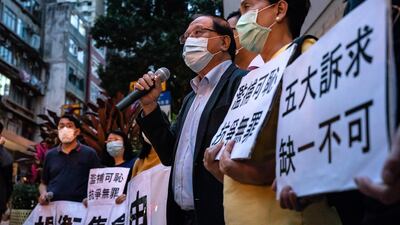Police in Hong Kong carried out raids against high-profile democracy campaigners on Saturday, arresting 15 activists on charges related to protests that rocked the Asian financial hub last year.
Among those targeted was 72-year-old media tycoon Jimmy Lai, founder of anti-establishment newspaper Apple Daily, who was arrested at his home.
Others included former politicians Martin Lee, Margaret Ng, Albert Ho, Leung Kwok-hung, Au Nok-hin and serving politician Leung Yiu-chung.
They were accused of organising and taking part in unlawful assemblies in August and October, according to the police.
Five were arrested on suspicion of publicising unauthorised public meetings in September and October.
"The arrestees were charged, or will be charged, with related crimes," Superintendent Lam Wing-ho said.
All 15 were due to appear in court in mid-May.
US Secretary of State Mike Pompeo called the arrests "deeply concerning", saying in a tweet that "politicised law enforcement is inconsistent with universal values of freedom of expression, association, and peaceful assembly".
Following his release on bail, Mr Lee, known as the father of democracy in Hong Kong, said he felt "relieved" to have been arrested.
"Finally I've become a defendant. How do I feel? I'm very much relieved," the 81-year-old barrister and founding chairman of the city's first political party said.
"For so many years, so many months, so many good youngsters were arrested and charged, while I was not arrested. I feel sorry about it."
He added that he did not regret his actions and was proud to walk with Hong Kong's youngsters in their fight for democracy – remarks the city's police chief Chris Tang said left him "very worried and surprised".
"As a veteran of the legal profession... he continues to incite youngsters to violate the law. I don't think he should feel proud, he should feel ashamed," Mr Tang said.
Media boss Mr Lai was detained in February in connection with his participation in another August rally that was banned by police for security reasons.
Hong Kong was shaken by widespread and sometimes violent street protests in 2019, sparked by a now-abandoned proposal to allow extraditions to the Chinese mainland.
Last year's rallies became a wider movement calling for greater freedoms in the most concerted challenge to Beijing's rule since the former British colony returned to Chinese sovereignty in 1997.
The protests and clashes with police have since died down, partly because of exhaustion and arrests but also because of the emergence of the deadly coronavirus.
China's leaders have refused to accede to the protesters' demands, which include fully free elections in the city, an inquiry into alleged police misconduct during the protests, and an amnesty for more than 7,000 people arrested during the movement, many of whom were under the age of 20.
Chris Patten, Hong Kong's last colonial governor before the 1997 handover, said the arrests were another step towards burying the city's autonomy.
"This is not the rule of law. This is what authoritarian governments do," he said.
"It becomes ever more clear, week-by-week and day-by-day, that Beijing is determined to throttle Hong Kong."


